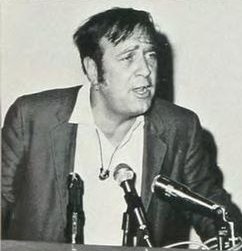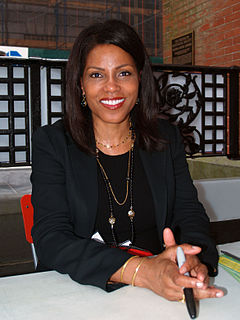A Quote by Bram Stoker
Within, stood a tall old man, clean shaven save for a long white moustache, and clad in black from head to foot, without a single speck of colour about him anywhere.
Related Quotes
I can't turn around without hearing about some 'civil rights advance's White people seem to think the black man ought to be shouting 'hallelujah's Four hundred years the white man has had his foot-long knife in the black man's back — and now the white man starts to wiggle the knife out, maybe six inches! The black man's supposed to be grateful? Why, if the white man jerked the knife out, it's still going to leave a scar!
I've never seen a sincere white man, not when it comes to helping black people. Usually things like this are done by white people to benefit themselves. The white man's primary interest is not to elevate the thinking of black people, or to waken black people, or white people either. The white man is interested in the black man only to the extent that the black man is of use to him. The white man's interest is to make money, to exploit.
The prejudice many photographers have against colour photography comes from not thinking of colour as form. You can say things with colour that can't be said in black and white... Those who say that colour will eventually replace black and white are talking nonsense. The two do not compete with each other. They are different means to different ends.
From the cab stepped a tall old man. Black raincoat and hat and a battered valise. He paid the driver, then turned and stood motionless, staring at the house. The cab pulled away and rounded the corner of Thirty-sixty Street. Kinderman quickly pulled out to follow. As he turned the corner, he noticed that the tall old man hadn't moved but was standing under the streetlight glow, in mist, like a melancholy traveler frozen in time.
The black man in North America was sickest of all politically. He let the white man divide him into such foolishness as considering himself a black 'Democrat,' a black 'Republican,' a black 'Conservative,' or a black 'Liberal' ...when a ten-million black vote bloc could be the deciding balance of power in American politics, because the white man's vote is almost always evenly divided.
We have to stop making excuses. One of the things that I'm careful to show is the horrendous effects of institutional and structural racism, but in the end, you can't wait for white man or a Black man to come riding in on a white horse to save you. We have to save ourselves, and that's the lesson of "The African Americans."
I used to tell the story about as a young man in high school one of the professors came in and put a broad white sheet on the board with a dot in the right hand corner and said, "Boys, what do you see?" And we all shouted, a black dot. He stood back and said, "not a single one of you saw the broad white sheet, you all saw the black dot." He went on to tell us to focus on the broader picture, don't focus on the negative.
I come home that morning, after I been fired, and stood outside my house with my new work shoes on. The shoes my mama paid a month's worth a light bill for. I guess that's when I understood what shame was and the color of it too. Shame ain't black, like dirt, like I always thought it was. Shame be the color of a new white uniform your mother ironed all night to pay for, white without a smudge or a speck a work-dirt on it.
[Black nationalism] is not designed to make the black man reevaluate the white man--you know him already--but to make the black man re-evaluate himself. Don't change the white man's mind; you can't change his mind. And that whole thing about appealing to the moral conscience of America--America's conscience is bankrupt.
The Honorable Elijah Muhammad says that the black man in America, for the past 400 years, has been like a boy in the white man's house, begging the white man for a job, for food, clothing and shelter. And then after the white man provides him with all of these things, he turns around and get - has the nerve to get angry at the white man when the white man tries to control his life.


































